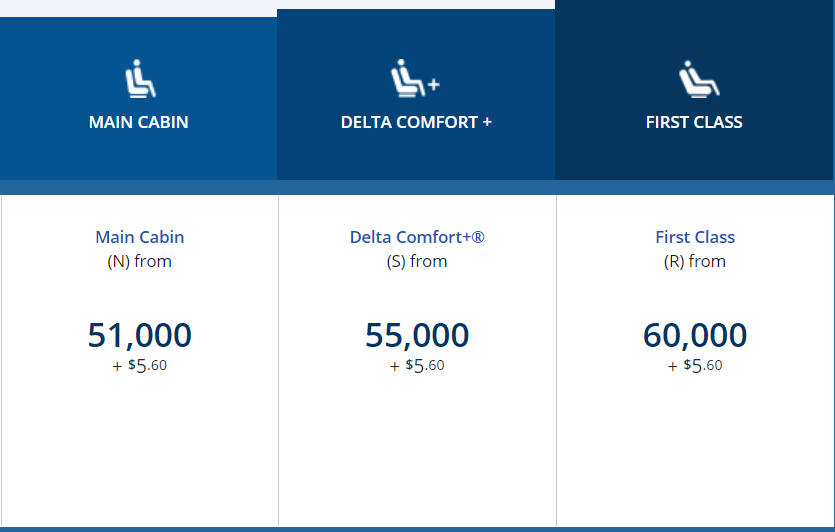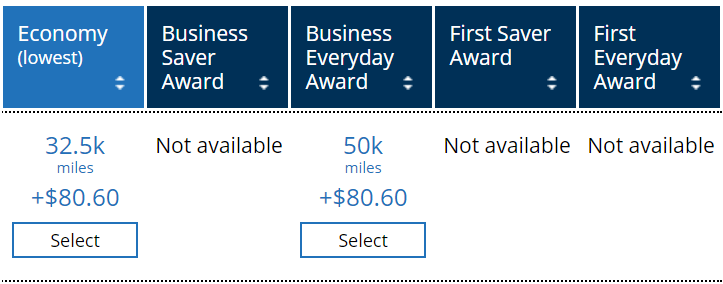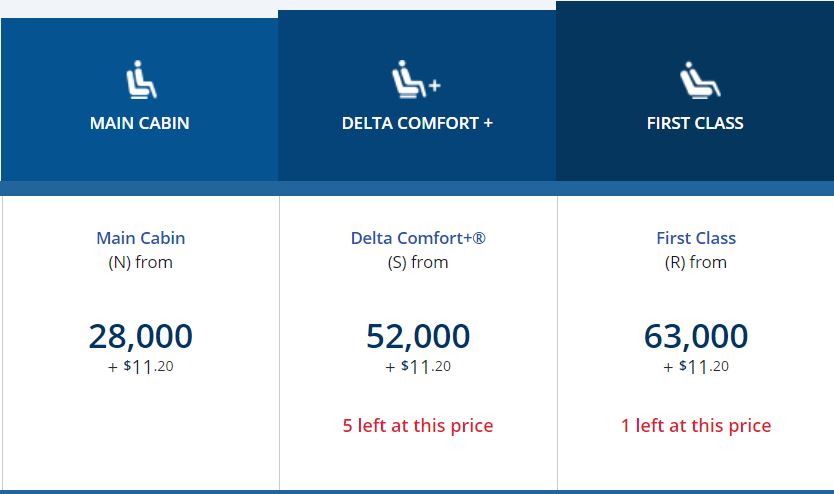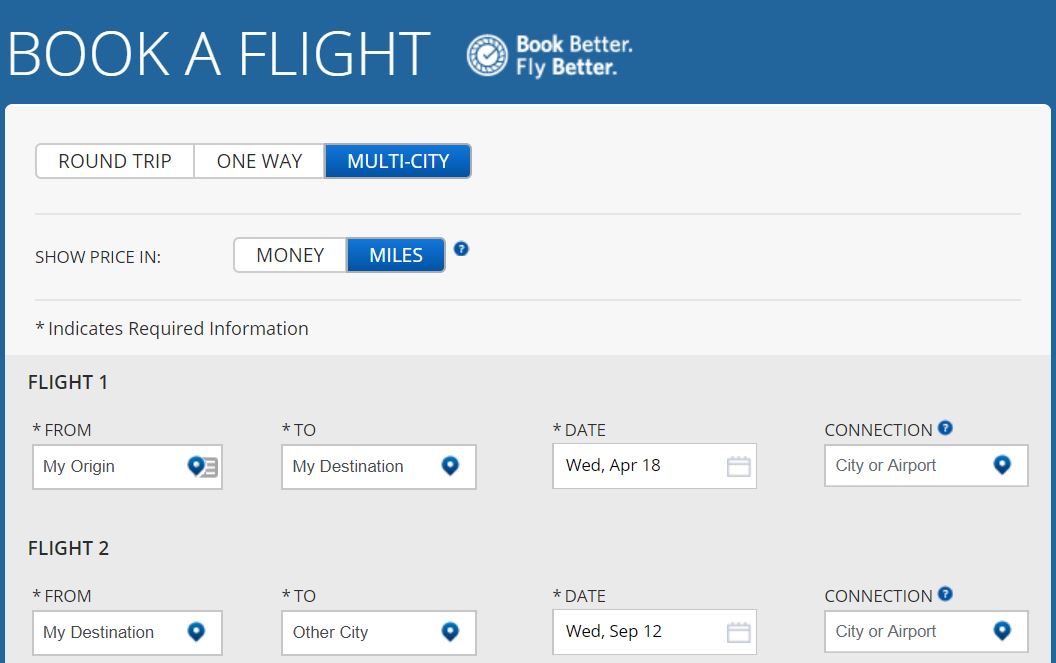NOTICE: This post references card features that have changed, expired, or are not currently available
I usually have good luck booking Delta awards at low mileage rates, especially when my flight dates and times are flexible. For an recent trip, though, I had to fly one-way on a specific date and within a specific time window. For this short flight (which Delta sometimes offers for as low as 8,000 miles one-way), they wanted 51,000 miles. The cash ticket price for this flight was $557, so I’d still get slightly over 1 cent per mile from my SkyMiles, but come on… 51,000 miles is too much for a short domestic flight.

United was the only other carrier offering a flight that met my needs. They wanted 32,500 miles plus $75 for their close-in booking fee (the price shows $80.60 because it also includes the $5.60 TSA fee). That’s better than Delta, but still far from a bargain (United’s cash price was also $557 by the way).
Round trip for less with a throw-away return
Luckily for me, Delta often charges less for round trip flights. This is true for both cash prices and mile prices. The exact flight I wanted was available for 28,000 miles round-trip. Even though I didn’t need the return, this was a better deal. By adding this throw-away return leg, I could save 23,000 miles (but I would have to pay an extra $5.60 in TSA fees).

This does not work with AA, Southwest, or United. They price each direction of a round-trip award separately.
Multi-city for less with a throw-away return to somewhere else
Next, I used Google Flights to figure out which routes Delta routinely sells cheaply from my destination city. Then, I ran one-way searches on Delta.com to find dates where Delta offered cheap awards to those cities (cheap awards don’t always line up with cheap prices identified by Google Flights). I then went to Delta’s Multi-City search and plugged in my desired flight info under “Flight 1” and a return flight to a different city under “Flight 2” (note: sometimes works with a completely different set of from/to airports under “Flight 2”). After playing with a number of different dates and destinations, I was able to drop the overall price to 23,000 miles. I’ve done even better with this trick in the past, but it’s time consuming so I called it a day and booked it.

Add a Leg Instead
A similar option for making one-way flights cheaper with cash or miles is to find a cheaper destination beyond the airport you want to fly to, make sure there’s a layover at your destination, and then simply do not fly the last segment. This is referred to as “hidden city ticketing” or skiplagging. In my recent example, I couldn’t find any good skiplag options, so I went with the multi-city round-trip instead.
Skiplagging can be a fantastic way to save cash or miles, but it also has more potential gotchas then a throw-away return ticket. For full details please see: Skiplagging for the best flights at the best price.
Practical and ethical considerations of the throw-away return
Airlines don’t like it when people book round-trip flights to save money or miles, but there’s nothing illegal about it. And I have yet to find any case where an airline has penalized a flyer in any real way because of it. The main issue I see is that this approach takes away seat availability on the return trip which you don’t intend to fly.
I can think of a few steps you can take to reduce the harm here:
- Book the return further into the future.
- Select the least desirable return departure time (e.g. 5am, 11pm)
- Cancel the rest of your ticket after you fly the desired one-way
By following the above advice, it’s unlikely that anyone will be inconvenienced by your shenanigans.


[…] Reduce Delta one-way award cost by adding a throw-away return. […]
Delta non revs on stand by love it. You’ve basically booked a seat that will not show as available until close to departure. Win win for you and them.
[…] Reduce Delta one-way award cost by adding a throw-away return […]
Surely cancelling an unwanted return leg (instead of no-show) will attract a cancellation fee at the very least, and maybe a re-pricing of the itinerary?
Great post! Basically circumventing married segment logic or HCT. I had no idea HCT was called skiplagging. Guess that explains that website’s name!
[…] Reducing the cost of some Delta one way awards with throwaway returns […]
Book the return out as far you can and hope for a schedule change.
Why bother cancelling the return? If the flight gets cancelled, you get a refund. If airlines won’t even return the taxes/fees on flights that you don’t fly (and they don’t remit) it seems like you are giving the airlines the ability to sell another seat but they won’t help you out in return?
If the airline does cancel, what amount would they refund you? If the ticket was reassessed, as a one way fare is more expensive there is no refund due. Of course if you’re an elite the airline may give you some sympathy points?
That is not how tickets are priced. Each way of a round trip has its own fare.
You can use the return. 72 hour rule doesnt apply for return.
I guess you mean that if you have Platinum or Diamond elite status (which lets you change awards for free), you can change the return flight to one you’ll actually use. Is that right?
Yes. Sorry, was being lazy in my writing since typing on my phone…
Just HCT’ed Southwest for the first time last week!
Cool. Yes even though Southwest, AA, and others don’t work with the round-trip trick, they will work with hidden city ticketing (dropping the last leg)
Yup. Had to really put in the effort to find the flight, though! Wish there was a web site to automate it… might have to build a GreaseMonkey script…
Isn’t this the whole concept around skiplagged.com, where airlines were shutting down people’s rewards accounts (i.e. losing all points) for doing it?
Yes it’s the same idea, but that is with cash tickets where this is with airline miles. With hidden city ticketing there was a lot of press a while ago about airlines threatening to shut down people who did this often, but I haven’t seen any confirmed accounts of real shutdowns.
I’d also say Skiplagged is different than booking a return you don’t intend to use. Skiplagged is entering your destination and finding it as a connecting point on a one-way ticket elsewhere to save money. For example, you need to fly LAX-ATL one-way and it’s cheaper to book LAX-MCO with an ATL connection. You can’t check a bag and you risk having a cancellation have you connect in another city, like DTW, since you’ve “contracted” the airline to fly you from LAX to MCO instead of LAX to ATL.
What Greg is pointing out is that if LAX-ATL one-way is 50,000 miles, but booking LAX-ATL and then an ATL-LAX return in the future is 34,000 miles, you can book a separate return ticket in the future to save miles. You still have a “contract” with the airline to fly you from LAX-ATL, and you’ve also made a reservation on an ATL-LAX flight in the future that you may need. If you don’t use it … life happens – you made an LAX-ATL reservation (that you flew) and an ATL-LAX reservation that you were unable to fly but Delta still took your monies. I don’t see any issue with this. There are plenty of elite status holders who make speculative mileage bookings for flight they may or may not take simply because canceling and redepositing the miles is free for them.